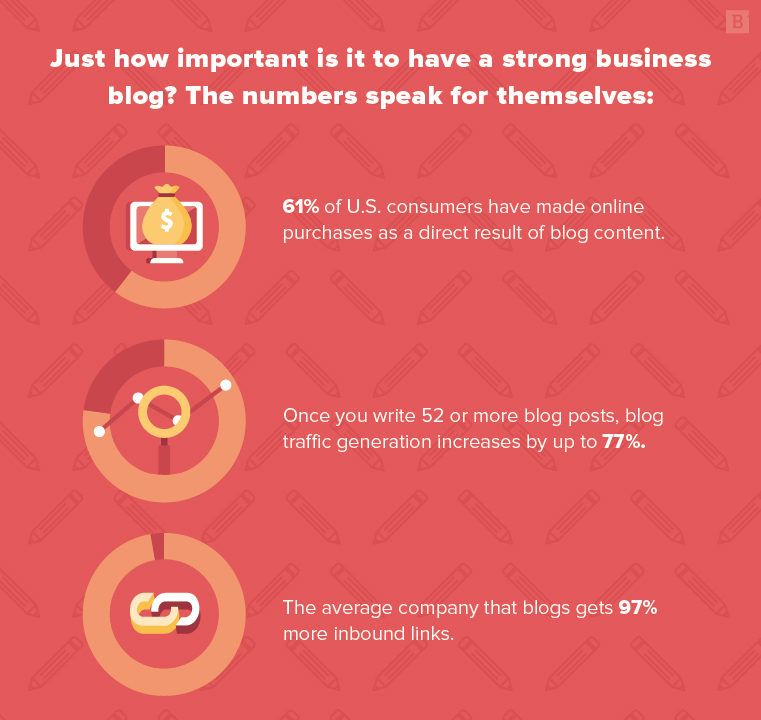Just how important is it to have a strong business blog? The numbers speak for themselves:
- 61 percent of U.S. consumers have made online purchases as a direct result of blog content.
- Once you write 21-54 blog posts, blog traffic generation increases by up to 30 percent.
- Once you write 52 or more blog posts, blog traffic generation increases by up to 77 percent.
- The average company that blogs gets 97 percent more inbound links.
This doesn’t mean you should throw something together ASAP just to say you have a blog.
Low-quality content that neglects the core tenets of search engine optimization will do more harm than good. Keyword stuffing, bad linking practice, misalignment with searcher intent and other content marketing gaffes will result in search-engine ranking penalties that make it harder for prospects to find your business on the web.
You’ll need bonafide blogging experts if you want to create high-quality content that gets results.
But do you hire in-house, outsource to an agency or dig up some low-cost freelancers? And how exactly do you measure quality of your output? What does “high quality” even mean? Read on for the answer to these and other key questions about blog content creation.

In-house vs. agency vs. freelance
It’s the old “build or buy” question re-framed for business blogging. You can hire blog writers to work in house. Or, you can pay an agency or a team of freelancers to create content for you at a lower cost. Both have their strengths and weaknesses, and because no two businesses are exactly alike, neither is definitively better than the other.
Nevertheless, the majority of organizations will probably find that the agency model is the best balance of cost, quality and versatility. Granted, we have our biases, but they’re not unfounded.
Let’s take a closer look:
Hiring in-house: The most expensive option by far
Say your plan is to hire blog writers in house. The average salary for a web content writer with one to five years of experience, according to Robert Half, is between $47,750 and $71,750. Writers with more than five years of experience earn between $67,500 and $98,000. This doesn’t include the general costs associated with hiring a new employee, which is an additional $4,921 according to the Society for Human Resource Management (SHRM). You also need to consider benefits and paid time off.
Also, are you looking for someone to populate your blog with some posts, or are you trying to create copy that fits into a larger content marketing strategy?
If it’s the latter, be forewarned: A content marketing strategist earns between $77,500 and $109,000 annually. Good luck finding a CMS who can also write killer copy at a reasonable price, or conversely, a content writer who is Google Analytics-certified, can perform advanced keyword analysis, devise a content marketing strategy and demonstrate return on investment for your business.
As for the benefits of hiring in house, you get complete control over your employees, and you can train them in the nuances of your brand. They will be loyal, they will do great work and, depending on how experienced they are, they may be able to create a breadth of content types for you.
Even then, though, the price is just too steep for most organizations. We haven’t even covered the fact that these employees will need access to professional content marketing tools such as SEMrush, MarketMuse and Buzzsumo; project management resources; email accounts; CRM access; office space; computers and so on.
You get a great pair of helping hands when you hire content marketing expertise, but it’ll cost you an arm and a leg.
Freelancers: A dime a dozen, but you get what you pay for
If you know where to look, you can find dirt-cheap content. But it’s hard to find writers who understand the nuances of your brand and industry, or who are willing to take the time to get on a call with you to learn them. Unfortunately, the market for freelance writing usually has two models:
- Writers get paid by the hour.
- Writers get paid per article.
In other words, don’t expect a freelancer to function as an extension of your business. They’ll churn out words for you (and the quality of those words will likely coincide with how much money you give them). A long-term relationship can certainly happen, but don’t gamble on it. They’ll drop you the moment they find a more valuable use of their time, and their prices will go up as they build credibility.
Also, if you’re going with cheap freelancers and your existing marketing staff doesn’t have time to edit, fact check, align the messaging with your brand voice and make sure that a professional style guide is uniformly applied (e.g., AP Style), then be prepared to hire a content manager. These will put you out $66,000 to $90,250 annually.
This isn’t to say that freelancers don’t have their place. If you have an immediate, temporary content need and are unwilling (or unable) to sign a contract with an agency, freelancers are the optimal choice.
Beyond that, though, don’t expect deep versatility in terms of their industry knowledge. And don’t presume that they’re privy to the nuances that distinguish B2B and B2C marketing, or that they have experience creating a diverse range of content types.
Consider yourself warned: Quality freelancers are hard to find and easy to lose.
The agency model: Predictable quality at a predictable price
Let’s start with quality.
Content marketing agencies are staffed with all the resources needed to create high-quality content. We can define high-quality content as a blog post or piece of marketing collateral that is well-strategized for SEO purposes, tailored to your target audience and executed with precision.
Take the example of a written blog post. In an agency setting, it will be content mapped to identify the most effective topics to cover. An SEO-savvy content writer will identify primary key phrases using a resource such as SEMrush and create a content template that prescribes an ideal length for the piece and the semantic keywords that should be mentioned throughout. Once written, the article will undergo at least one round of edits and will then be subject to the scrutiny of a project manager.
But even before any of that, a content marketing strategist will have performed competitive analysis and preliminary keyword research to guide the creation of certain assets. And after production, the strategist can help with recommendations of how to most effectively promote the content. Content marketing agencies also provide imagery and have design capabilities to create custom illustrations and graphics to go along with blog posts – and multimedia is kind of important.

Then there’s versatility.
For the sake of argument, let’s say you just want to create some content, and you have all the strategic muscle you need in your organization. Should you just freelance?
Well, that depends on what you’re creating and whether or not you need those assets to be backed up by content mapping. You may be able to forge a relationship with a writer who has the resources to do this for you, and who can create compelling, well-researched and polished copy.
Generally speaking, though, agencies are better suited to any sort of consistent content creation need that warrants a long-term relationship. Their pricing will be much more consistent, and you’ll never have to worry about looking for new writers because your top freelancer upped his or her rates (or got a steady job with an agency).
And speaking of writers, a seasoned content writer can draft press releases, blog posts, white papers, email copy, eBooks, video scripts, landing pages, infographic outlines, company brochures, ghost-written articles for industry magazines and so much more. Finding a freelancer who has this level of advanced content versatility won’t be easy. Moreover, his or her price rates will most likely exceed the amount you would pay an agency that is fully staffed with writers who can do all of the above proficiently.
That leaves cost.
A mature content marketing agency or article writing service will have fixed pricing models and the ability to provide quotes with much greater precision than a freelancer. This means that spend can be reallocated flexibly. You’re not locked into X number of blogs if halfway through a six-month scope you realize you need landing page copy.
Not to mention, an agency rolls all of the expertise (strategy, project management, writing, design) into the cost of its services.
In other words, you’re getting the core amenities of a complete, in-house content marketing team without the gargantuan overhead. Could you find cheaper freelancers? Sure. And if you only have a very specific, one-time content need, it may be the best choice. But they won’t give you the consistency, the attention, the cost-effectiveness or the pricing predictability of the agency model.
To phrase it as a buzzword, it’s content marketing-as-a-service.
A few final thoughts
Working with an agency is the best alternative for a business that’s considering hiring in-house blog writers and, potentially, content strategists. By comparison, attempting to coordinate, manage and pay multiple freelancers and/or contractors in different content roles can become a demanding, if not tedious, balancing act.
Still, we’ve encountered many a shrewd marketing manager with in-house staff capable of handling certain content marketing tasks (e.g., social, some analytics, design, etc.) but are primarily interested in keyword-driven, high-quality blog content.
This is to say, use an agency as you see fit, and don’t be afraid to supplement their services with freelancers and in-house staff.
Your business, your world. The rest of us just live in it.





